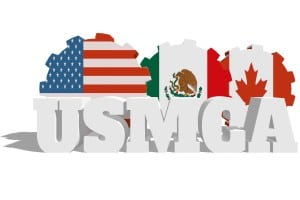What is USMCA?
What is USMCA?
The United States-Mexico-Canada Agreement, also known as the USMCA, is a trade deal between the three nations which was signed on November 30, 2018. The USMCA replaces the North American Free Trade Agreement (NAFTA), which had been in effect since January of 1994. Under the terms of NAFTA, tariffs on many goods passing between North America’s three major economic powers were gradually phased out. By 2008, tariffs on various agricultural and textiles products, automobiles, and other goods were reduced or eliminated. USMCA came about as a result of U.S. President Donald Trump’s efforts to replace NAFTA based on an argument that the terms of NAFTA were unfair to the United States. USMCA began as the U.S.-Mexico Trade Agreement, announced in late August of 2018. A few weeks later, on September 30, 2018, the United States and Canada formally agreed to replace NAFTA with the new agreement, and the USMCA was finalized a few weeks later.
On May 31, 2019, a day after the three countries began the formal process for the revision of NAFTA, Trump said starting June 10 the U.S. will impose a 5% tariff on all Mexican imports. The tariff will gradually increase until Mexico stops migrants from crossing the border into the U.S. Experts say this policy will jeopardize the ratification of the trade deal.
The USMCA is a result of U.S. President Donald Trump’s efforts to replace NAFTA based on an argument that the terms of NAFTA were unfair to the United States.
 Important Provisions
Important Provisions
Per the Office of the United States Trade Representative, the USMCA is a “mutually beneficial win for North American workers, farmers, ranchers, and businesses.” NAFTA aimed to create a free trade zone between the U.S., Canada, and Mexico, and the USMCA utilizes NAFTA as a basis for a new agreement. While the USMCA has a broad impact on trade of all kinds between the three named nations, some of the agreement’s most important provisions include the following:
- Dairy and Agriculture
Under the terms of the USMCA, the U.S. enjoys tariff-free access to 3.6% of Canada’s dairy market. U.S. farmers can now sell more of their agricultural products in Canada without being subject to Canadian pricing provisions which place limits on imports of some of those products. U.S. agricultural exports to Canada may increase by about $70 million; while this is not an insignificant figure, it nonetheless represents just a fraction of a percent of U.S. GDP. On average, the U.S. has sent well over $600 million worth of dairy products to Canada for each of the past several years. - Automobiles
One of the most significant portions of the USMCA stipulates new trade regulations for automobiles and automotive parts. Under NAFTA, cars and trucks with at least 62.5% of their components manufactured in one of the three participating countries could be sold free of tariffs. The USMCA increases that minimum requirement to 75%. A major reason behind the change in policy was a desire among all three nations to incentivize the manufacturing of cars in North America. At the same time, the USMCA stipulates minimum wages for workers in the automotive manufacturing process: 30% of the work done on eligible vehicles must be accomplished by workers earning at least $16 (USD) per hour, as of 2020. The agreement stipulates an increase in wages over subsequent years, as well. - Intellectual Property
The USMCA makes provisions for intellectual property and digital trade which were not included in NAFTA. Among other changes to trade policy, the new agreement extends the copyright period to 70 years beyond the life of the creator, an increase of 20 years in some cases. The USMCA also addresses new products which were not part of international trade when NAFTA was drafted in the early 1990s: the new agreement prohibits duties on music, e-books and other digital products. Internet companies were also removed from liability for content generated by their users.




